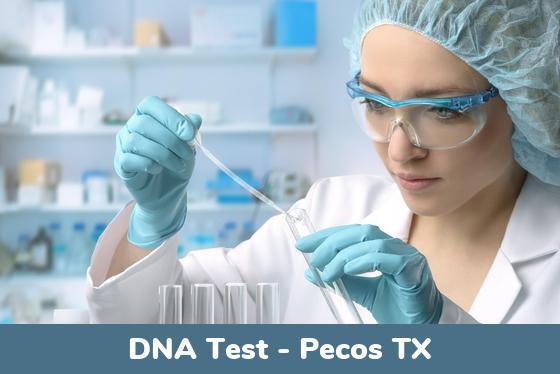
DNA Testing in Pecos, Texas
At Health Street's Pecos, TX testing centers, you can get DNA testing or paternity testing for yourself or another person. We have many clinic locations in town. Register for DNA testing, select a clinic, and schedule online. DNA paternity testing and other DNA tests, such as testing for siblings, aunts, uncles, or grandparents, are done at our centers in Pecos.
Appointments can be scheduled together or separately, and tests are performed with a quick cheek swab at our testing centers. Test results can be used for legal matters such as child support or to change a birth certificate, or for a simple peace of mind. Call (432) 242-4112 or just sign up on the website. We'll text and email a barcode so you or the person you are testing can come right in. Doctor-signed, accurate results are reported quickly and securely online.
Workforce Screening, Digitally Delivered
DNA Test - Pecos, Texas

Paternity Testing in Pecos, Texas
There are several types of DNA testing services that are offered at our Pecos testing centers to validate close family relationships. The most commonly ordered DNA test is a legal paternity test to conclusively establish whether or not a man is the biological father of a child. Health Street's 21 marker DNA paternity testing is the state of the art. Our paternity test results are statistically conclusive at the rate of 99.9% or greater.
Other DNA Tests
Relationship Tests to validate grandparent to grandchild, siblings, half-siblings, aunts, and uncles:
DNA tests such as sibling or avuncular studies, can sometimes come back with a result of less than 95% certainty. This is normal, especially if only two parties participate in the test. Adding an additional close relative to the test helps us learn more about the family's DNA composition and typically leads to a more conclusive result.
Specimens we can test for DNA
The easiest and most reliable way to perform a genetic sample collection for a paternity test is by a swab of the inner cheeks. These skin cells, known as buccal cells, rub off easily onto cotton swabs and remain in place, to be extracted by our testing laboratories for analysis.
Other specimens, such as hair follicles, fingernails, and garments that might contain someone's DNA, can also undergo lab testing to see if there is a match. These non-standard DNA tests are done by registering online for an Alternative Specimen DNA Test (Nails, Teeth, Fabric). Once registered, you ship the DNA sample to our lab. We'll attempt to extract the DNA and compare it to a cheek swab of the other party.
Legal DNA Tests vs. "Peace of Mind" At-Home Tests
When deciding which type of DNA test is right for you, consider first what you might do with the results. In order for the results to hold up in court, the DNA specimen must be collected at a clinic using strict chain of custody procedures. The DNA testing technicians at our Pecos test centers are trained to follow guidelines that ensure that the results can be used for legal purposes.
The results of our legal DNA tests can be used for any legal purpose:
Home tests offer more flexibility:
Home DNA tests are specimens containing DNA (or possible DNA) that are shipped to us for analysis. The results of these home tests cannot be used in court (since there is no way to prove whose specimens were actually sent). However, the tests are just as accurate and can provide peace of mind. At-home DNA tests also offer a lot more flexibility.
In addition to commonly mailed in DNA specimens like hair follicles, we can also extract DNA from other bodily fluids. We can even try and lift the DNA left on items like clothing, a toothbrush, or a straw. If we can get the DNA from the alternative item, we can then compare it to another person to see if they are related. Some examples include:
How to schedule a DNA Test in Pecos TX
Scheduling a DNA test at one of our Pecos clinics is simple and fast, and we often have appointments available in the same week, though it's always helpful to schedule in advance to make sure you get the time you want. We have clinics in Pecos, plus many more throughout Texas and across the United States. During registration, we'll show you the nearest locations so you can choose the one that's most convenient. You'll pick the times and days that you prefer.
You can set up separate appointments for each of the people being tested, either at the same location or at different locations. You'll get an email and text message with your appointment information. There is no fee if you need to change the time or location of a DNA test appointment at any time.
How long it takes to get results of a DNA test
Paternity tests conducted at one of our Pecos facilities typically take about a week to come back. Other relationship tests, such as sibling studies, can take a few days longer to come back. When the results are ready, you are notified immediately via email. Then, the hard copies of the paperwork are sent afterward via regular mail.
The DNA test appointment - what to expect and what to bring
The appointment itself only takes about 15 minutes. The specimen collection process is a simple and painless cheek swab. No needles are used. When you're being tested at our Pecos clinic, you'll be asked to provide fingerprints and to show photo identification. We'll also take pictures of the people being tested so that the final report will include legal assurances of who was actually tested.
For infants, hospital discharge papers qualify as identification. Otherwise, a birth certificate or social security card can be used as ID for a child. No other preparations are required for this appointment.
Does the mother need to be present at a paternity test?
If a man is considered the legal father of a child, then the mother does not have to be present or give consent for paternity testing. However, if he is not currently considered the legal father, then he cannot sign for the child. Therefore, the mother does need to be there. If neither parent is available, other legal guardians can bring the child so long as they have the right to make medical decisions on the child's behalf.
DNA testing if one party is not in Pecos
The two parties testing (for example: father and child) do not have to be tested at the same time or even at the same location. We have many clinics across Texas as well as nationwide, so we can test one party in Pecos and the other party anywhere else in the USA. The specimens are then matched up in the lab for analysis.
Laboratory certifications
Health Street works strictly with AABB Certified labs for DNA testing. All specimens that are collected in Pecos or elsewhere are shipped securely from our testing locations to a nationally certified laboratory.
Why Health Street
Over a Decade of Experience
Health Street has been performing DNA testing nationally since 2010. We have helped thousands of people from Pecos to communities all across the USA get DNA tests and paternity tests.
Dedication to Excellence
Our dedication to excellence includes our commitment to provide compassionate services and to helping people obtain the accurate DNA testing in Pecos that they need.
Facts about DNA Testing in Pecos TX
Establishing Paternity for Child Custody Purposes in Pecos, TX
In Pecos, TX, if a mother and a father are not married when the child is born, the father is not the legal father until paternity is established.
Paternity can be established voluntarily by both parents signing an Acknowledgment of Paternity document (AOP). For this to happen, both parents need to work with someone who is AOP certified. If the mother's husband is not the biological father of the child, the "Denial of Paternity" section of the AOP must be completed.
If there cannot be an agreement on if the man is the biological father or not, to make a determination, the court may order paternity testing.
Experts Say...
According to the Texas Law Office of Bryan Fagan, PLLC, "You are not going to be granted paternity rights to a child that is biologically yours unless you do something about it. Note that there are plenty of men who are biological fathers to children and have zero legal rights to raise that child. The main reason for this problem is that fathers did not do anything to establish paternity during the early years of that child's life. If you do not want that to be your reality it would behoove you to speak (to) an attorney about establishing paternity rights for yourself early rather than waiting until later to do so."
As a father, establishing paternity will give you rights to custody and visitation. Parents that have equal custody rights also have equal say in decision-making, including medical treatment, education, and religion.
Springer Law Firm, located in Katy, TX, stated in a blog post, "Dads who confirm their paternity are also protected from (having their child) adopted without their prior consent. In the state of Texas, babies' fathers are required to submit proof of their paternity to the Department of Vital Statistics during the first 31 days after a baby is born. Provided that they do so, the clerk of court will notify the father of any impending adoption proceedings so that they can be disputed."
Additional Services
Health Street offers a variety of other services, including:
